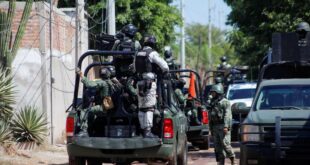DUBLIN (Reuters) -Ireland said on Wednesday it would mount a legal challenge against Britain over a new law giving conditional amnesties to former soldiers and militants involved in decades of violence in Northern Ireland.
Britain has halted prosecutions of those involved in three decades of bloody conflict in Northern Ireland, saying they are unlikely to succeed and an independent body should be set up instead.
Victims’ families, human-rights organisations and all major political parties on the island of Ireland – including British unionist and Irish nationalist – have condemned the law which offers immunity from prosecution for those who cooperate fully with the new investigative body.
Micheal Martin, Ireland’s minister for foreign affairs, said it had not come to the legal decision easily, but Britain had not engaged properly on the move. Ireland said it would argue that the UK move is incompatible with its obligations under the European Convention on Human Rights.
“The British government enacted this legislation on 18 September 2023, shutting off any possibility of political resolution,” Martin said.
“We now find ourselves in a space where our only recourse is to pursue a legal path.”
Britain’s Northern Ireland minister, Chris Heaton-Harris, said the UK government profoundly regretted the decision taken by the Irish government, and described the challenge as “unnecessary.”
“The decision comes at a particularly sensitive time in Northern Ireland. It did not need to be taken now, given the issues are already before the UK courts,” he said in a statement.
Around 3,600 people died in three decades of confrontation between Irish nationalist militants seeking a united Ireland, pro-British “loyalist” paramilitaries and the British military. The conflict largely ended with a 1998 peace deal.
A number of victims’ families have already begun challenges against the new law in the Northern Ireland courts.
The announcement was welcomed by victims’ families and human-rights organisations. Amnesty International’s Northern Ireland deputy director, Grainne Teggart, said the challenge would be vital for victims in Northern Ireland and around the world.
“It’s fantastic news, a great Christmas present for people waiting for inquests, civil cases and prosecutions,” John Teggart, whose father was killed by British soldiers in the Ballymurphy area of Belfast in 1971, told Reuters.
“It’s just right that the Irish government is taking the burden off victims across the board with this legal challenge.”
(Reporting by Muvija M in London, Padraic Halpin and Graham Fahy in Dublin and Amanda Ferguson in BelfastEditing by Kate Holton, Kylie MacLellan, Toby Chopra and Matthew Lewis)
 BeritaKini.biz Berita Viral Terkini di Malaysia
BeritaKini.biz Berita Viral Terkini di Malaysia





